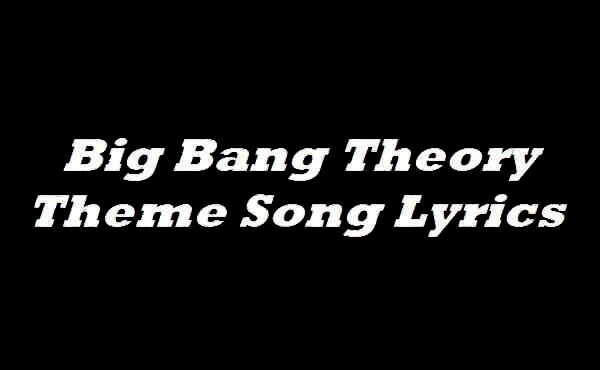Contents
- 1 Introduction to the Big Bang Theory
- 2 The Evolution of the Theme Song
- 3 Decoding the Lyrics: What Do They Mean?
- 4 References to Science and Pop Culture
- 5 The Connection to the Show’s Characters
- 6 Fan Theories and Interpretations
- 7 Conclusion: The Hidden Meaning Behind the Big Bang Theory Theme Song Lyrics
Introduction to the Big Bang Theory
You will find scientific wonders, offbeat humor, and eccentric genius in this fantastical world. We are here today to celebrate twelve incredible seasons of the much-loved comedy series The Big Bang Theory. The theme song’s lyrics are well-known, but have you ever considered their more profound meaning?
We shall be looking into the opening credits of every episode. Prepare yourself for a musical journey that will take you on a scientific journey with these iconic characters while making pop culture references, so fasten your seatbelts (or suspenders). Get ready to be astounded because we will explain the meaning of every syllable in the Big Bang Theory theme song lyrics in this article!
The Evolution of the Theme Song
Every great TV show needs a memorable theme song, and the great Bang Theory is no exception. After twelve seasons, the theme song has become a household name. But did you know it was revised multiple times before becoming its iconic tune?
The opening music and order of the large Bang Theory were modified during the first several seasons. Barenaked Ladies did record an instrumental tune, but they never intended for it to feature vocals. This adaption began what would become one of the most iconic sitcoms ever.
No matter the show’s popularity, its introductory titles never had voices. Consequently, for the third season of The large Bang Theory, the Barenaked Ladies revamped their instrumental tune.
The rewritten lyrics nicely captured the show’s geeky, scientific vibe. Philosophical statements such as “Our whole universe was in a hot dense state” hinted at the soon-to-be irreversible change in our favorite characters’ lives.
As fans eagerly awaited each new episode, every word of this upbeat theme tune was perfect for a sing-along. The large Bang Theory became more than a comedy series when Geek culture adopted the song. It turned into an anthem for anything nerd.
The next time you hum “The History Of Everything,” consider how far this tiny TV jingle has gone. On the surface, it might appear straightforward, but beneath those appealing tunes is a development that reflects the maturation of our cherished characters and their influence on popular culture.
Furthermore, who knows? Nothing in Sheldon Cooper’s always-changing universe or music stays the same, so perhaps we’ll witness another change in the large Bang Theory’s theme song.
Decoding the Lyrics: What Do They Mean?
The theme music from large Bang Theory is not simply a pleasant melody that sticks in your head—it’s also jam-packed with allusions and subtext. Let’s examine the lyrics and determine their meaning.
The opening line of the theme song goes something like, “Our whole universe was in a hot, dense state.” This remark brings up the so-called large Bang Theory of the cosmos. It lays the groundwork for subsequent advancements in both a scientific and symbolic sense.
Clever listeners could pick up on expressions like “Nearly 14 billion years ago,” emphasizing the link between astronomy and astrophysics. The lyrics dwell on the endless age and breadth of the cosmos throughout the song.
But there are connections to science and popular culture as well. “Autotrophs began to drool” is a perfect example of a humorous biological relationship.
The lyrics also highlight that several huge Bang Theory characters are very similar. For example, “Howard Wolowitz is singing this song” emphasizes Howard’s role in the program.
These interpretations may appear simple, yet there are a lot of fan theories about the hidden meanings in the lyrics. Some the huge Bang Theory viewers have taken specific lines to foretell future events or character arcs. Some might hint at future spin-offs or crossovers, depending on how many there are.
Music is powerful because it can make people feel and remember things for a long time. The science fiction underpinnings and quirky humor of one of the greatest sitcoms ever created on television are aptly captured by the huge Bang Theory topic song. Fans can find deeper meanings in the songs, which enhances the fun.
References to Science and Pop Culture
The huge Bang Theory topic song is complete with references to science and popular culture. The song’s first lines, “Our whole universe was in a hot, dense state,” immediately allude to the huge Bang theory. This scientific hypothesis clarifies the origins and evolution of our universe.
But it doesn’t stop there. For decades, listeners have been captivated by the song’s numerous references to popular culture. The line describes a developmental stage at which some species learn to manufacture their nourishment: “The autotrophs began to drool,” which exemplifies this.
Could anyone miss Einstein? Separating human evolution from earlier scientific accomplishments, the claim that “Neanderthals were developing tools” is well made.
The theme song references notable figures, including Galileo, Charles Darwin, Isaac Newton, and many more. The inventive works of these outstanding people profoundly shaped the modern world.
An excellent example of the technical jargon used in Star Trek and other popular TV shows is the sentence, “They built pyramids.” Referring to a popular science fiction series, this makes one question what the mysteries of ancient cultures were.
The references are deep and sophisticated, and those who like science and pop culture will like them. This essay delves into the intriguing and contemplative links between these two domains.
The Connection to the Show’s Characters
In addition to setting the tone for the show, the huge Bang Theory topic song introduces the characters. Not only is there music, but the lyrics also reveal something about the band members’ quirky personalities.
The show’s most bizarre main character, Sheldon Cooper, comes first. Lyrically, he is characterized as “not insane,” which is reasonable considering his peculiar habits and obsession with consistency. It exemplifies his logical nature and desire for structure in a seemingly disorderly setting.
Next, Leonard Hofstadter seems to be “hopeful” for love. Here, it is implied that he keeps going after Penny despite their disappointments and setbacks during the series. It reveals his desire for happiness and his romantic side.
Speaker number two is Howard Wolowitz, a “genius.” However, he may lack a Ph.D.
Technical and scientific domains are areas in which D. Howard excels; nonetheless, D. Hohis’s claim calls into question his massive ego and ceaseless quest for approval from others.
According to Raj Koothrappali, he likes to have inebriated phone or in-person talks with women. This essay examines Raj’s social anxiety experiences, focusing on how they affect his romantic relationships. It gives his presence throughout the season more nuance and humor.
Despite her beauty, Penny doesn’t realize how her actions affect the people in her life. In this section, Penny’s openness and compassion are highlighted. Even though she might not be as bright as her pals, she gives them the security and comfort they require.
The lines of the theme song can be compared to the characters’ regular interactions to learn more about each character. It demonstrates how music may be a storytelling mechanism in TV series such as the great Bang Theory.
Fan Theories and Interpretations
One of their most fascinating features is the plethora of fan theories and interpretations from successful television programs. Like everyone else, great Bang Theory fans dissect every aspect of the show—down to the theme song‘s lyrics. These theories provide viewers with an insight into the thoughts of devoted viewers, ranging from intricate scientific explanations to profound emotional resonances.
“Our whole universe was in a hot, dense state” could mean numerous things to different people. The singularity, or the place where matter and energy in the universe were concentrated right before the Big Bang, is one meaning it alludes to. Scientifically speaking, this makes excellent sense and demonstrates how our understanding of the universe has evolved.
Sentences such as “The Earth began to cool” are intended to reference astronomical occurrences and the individual’s development. Before realizing that science was their vocation, they went through periods of social disengagement like everyone else. They were emotionally distant from others and uneasy in social settings.
An interesting theory holds that the pop culture allusions in the theme song are intentional nods to significant story points where each character is featured. Leonard’s obsession with Indiana Jones and Penny’s deep affection for Han Solo from Star Wars are references to “Harrison Ford.”
Many television viewers believe that fan theories and interpretations greatly enhance the complexity and intrigue levels of their favorite programs. Comedies that explore the emotional aspects of fact and fiction coexisting are popular, such as The Big Bang Theory.
More details will emerge as we delve deeper into the concepts of this beloved sitcom. Seek wisdom at all times!
Conclusion: The Hidden Meaning Behind the Big Bang Theory Theme Song Lyrics
Big Bang Theory’s theme tune captures the program’s spirit so well that it does more than bring back happy memories. Since the controversial lyrics of each episode frequently make references to science and pop culture, they give fans a hint as to what’s to come.
There has always been a strong correlation between the music used on television and the host’s ability to evoke an emotional response from the viewers. “Big Bang Theory” has theme music that references Penny, Leonard, Sheldon, and their friends’ universe-building sites. By capturing the eccentricities and enthusiasm of both popular culture and scientific inquiry, it pays homage to both fields.
Figuring out these lyrics and examining additional fan hypotheses and interpretations will allow us to demonstrate how music enriches the viewing experience. This helps us learn more about the characters, their connections, and their personalities.
Verify that you’ve looked for every hint before tapping your foot or singing along to “The History of Everything” theme song. Also, the most popular songs may have the most hidden meanings.










